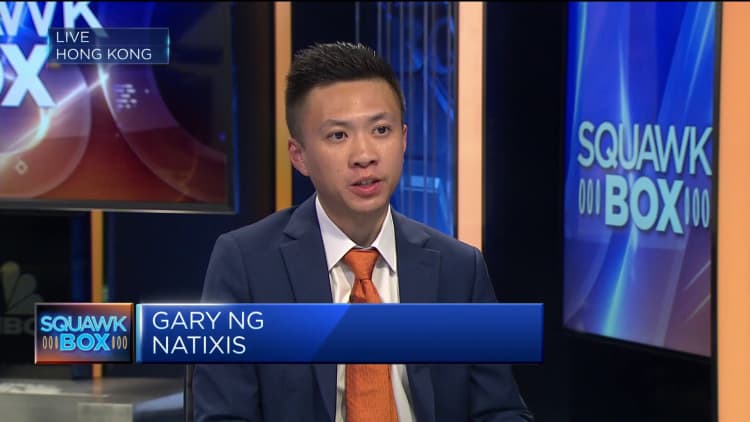Eric Hsu recalls a time when he was 10 days away from payday and only had $32 left. He had no savings.
“I used the remaining money I had to buy loaves of white bread and I ate that for all three meals until my paycheck came,” he told CNBC Make It.
“Sometimes I thought I wasn’t earning little, I would actually think I was earning an upper mid-table salary. But I still feel very poor every month.”
Hsu belongs to a group of people in Taiwan, typically young and single workers, called “yue guang zu” – the so-called “moonlight clan”.
The term describes being broke at the end of each month, or as Hsu describes it, “Money comes in from my left hand and out from my right.”
This behavior is very different from that of their parents, who literally saved every penny they have.
Chung Chi Nien
Hong Kong Polytechnic University
The term originated in Taiwan but is now also commonly used in mainland China and Hong Kong to describe the younger generation, said Chung Chi Nien, a professor at Hong Kong Polytechnic University.
According to a local report, an estimated 40% of young singles living in Beijing, Shanghai, Guangzhou and Shenzhen are living paycheck to paycheck.
“This behavior is very different from that of their parents, who have literally saved every penny they have. But the younger generation is spending every penny they have,” says Chung, who specializes in economic sociology.
The rising cost of living has put more people at risk of belonging to the “moonlight clan,” especially those on low incomes, Chung said.
While Taiwan’s inflation rate of 2.4% is much lower compared to many parts of the world, consumer prices and food costs continue to rise.
For 34-year-old A-Jin, fixed expenses like insurance, utilities and transportation already make up “more than half” of her salary of 30,000 New Taiwan dollars (about $985) a month, she told CNBC Make It.
“I was left with NT$10,000 a month for food and other expenses. Eating out now costs around NT$300 a day. There is no way to save,” said A-Jin, who works in the service industry.
“If an emergency happened to me, like a car accident, I wouldn’t have money to deal with it.”
Not just inflation
But for some others, it’s the “you only live once” mentality that encourages them to spend what they can — even if it means going into debt.
Since Hsu started work 10 years ago, the civil engineer has struggled to accumulate savings as he tries to pay off his student debt.
“Rather than save whatever leftover money I had at the end of the month, I decided to pay off my debt instead,” reads the CNBC translation of his Mandarin comments.
I let it get out of hand and figured since I have a credit card let’s buy a car while I have it.
But when a serious knee injury left him unemployed for two weeks without pay, Hsu realized he was unable to support himself.
“I thought since I can pay with a credit card and make my life easier, why not?”
But before he knew it, he had up to four credit cards and almost 70% of his monthly salary was going towards paying off such debts – leaving little left to save.
Hsu admitted that while half of his debt is for necessary daily expenses, the other half is due to his “lifestyle choices and desires.”

“I let it get out of hand and thought, ‘Since I have a credit card, let’s buy a car while I have it,'” said 38-year-old Hsu.
“Online shopping also exposes you to a plethora of things to buy, and the fact that it’s so easy to shop hasn’t helped.”
“Small but very secure luck”
The concept of the “Moonlight Clan” reflects the disillusionment that young people feel about life these days, said Chung, the professor. It is similar to other terms that have gained popularity in China over the past two years, such as “Tang Ping” and “Bai Lan”.
“In the context of East Asia, the parents of the Moonlight clan experienced a very successful industrialization and achieved their goals in life,” he added.
“But that’s a different reality for this generation … they see their parents’ success but just can’t match it. There is a huge gap between aspiration and reality.”
The “moonlight clan” exists primarily because home ownership is no longer within the reach of Taiwan’s youth — thanks to the lack of affordable housing, Chung said.
It can be anything from buying a cup of coffee at Starbucks to taking a trip abroad—things that give you a little happiness to make up for the loss of a larger purpose in life.
Chung Chi Nien
Professor, Hong Kong Polytechnic University
According to UN Habitat, housing is considered affordable when the home price-to-income ratio is 3.0 or less.
In comparison, Taiwan’s current ratio is 9.6 and 15.7 in Taipei City, according to the Interior Ministry.
“The expectation of buying your own house, getting married and starting your own family is way too far away now,” Chung said.
“Young people would rather give up that dream and spend money on things they are guaranteed to get today.”
These things are called “xiao que xin” – which means “small but very sure happiness” in Mandarin.
“It could be anything from buying a cup of coffee at Starbucks to taking an overseas trip — things that give you a little happiness to make up for the loss of an overall purpose in life,” Chung told CNBC Make It.

Hsu agreed, sharing a saying used in Taiwan that describes the current state of affairs: “Houses are not for living in, they are for investing.”
“A three-bedroom house now costs NT$20 million. How long do I have to save with my annual salary of NT$720,000?”
“You would only do anything seriously if you had a strong purpose. Without the ability to buy a home, it’s like, ‘There’s no point in making money if you don’t spend it,'” he added.
No long-term goals
A-Jin said she has no long-term financial or life goals and has “completely given up” on buying a house of her own.
“As long as I have food and my stomach can be full, I will not die. That’s enough for me,” she said.
“Since everything else is impossible, I’m just thinking about how to be kinder to myself, that’s all.”
For Hsu, he sees the hardest days behind him. In his experience, he canceled his credit cards two years ago and committed to saving a third of his salary every month.
Not knowing by payday if you would have enough money for food was a very scary condition – but it was my own fault and the punishment fits the crime.
However, he still sees himself as part of the “Moonlight Clan” because he is unsure if he would survive another emergency.
“I still don’t have any long-term financial goals… My priority is to pay off the rest of my credit card debt. I’m just scared of going hungry again,” he said.
“Not knowing by payday if you’d have enough money for food was a very scary condition — but it was my own fault and the punishment fits the crime.”
Do not miss: Think it’s too late to change jobs? Tell that to “Asia’s Best Cook”
Like this story? Subscribe to CNBC Make It on YouTube!

















